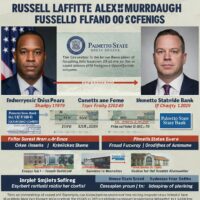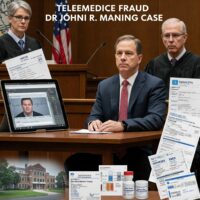Two Defendants Indicted For Healthcare Fraud And Money Laundering
SAN JUAN, P.R. – On November 29, 2016, a federal grand jury returned an indictment charging defendants Pedro Van Rhyn Soler and Edgardo Van Rhyn Soler with one count of health care fraud and two counts of money laundering for their participation in a scheme to defraud Multinational Life Insurance Company (“MLIC”), formerly known as National Life Insurance Company (“NALIC”),” announced Rosa Emilia Rodríguez-Vélez, United States Attorney for the District of Puerto Rico.
According to court documents, between 2006 and 2011, Edgardo Van Rhyn Soler was the Vice President and then President of National Life Insurance Company (NALIC), a health insurance company operating in the District of Puerto Rico. Between 2004 and 2012, the defendants were both co-owners of Option Health Care Network (Option), a company that provided administration services to insurance companies. In April 2006, Option signed a “Service Agreement” contract with NALIC allowing Option to be the third party administrator of NALIC’s health care division and granting Option ninety-five percent (95%) of NALIC’s income.
Starting in 2010, the Puerto Rico Health Insurance Administration, known as ASES, negotiated and contracted qualified health insurance agencies to provide services for Puerto Rico government employees. Before 2010, the Puerto Rico Department of Treasury (Hacienda) performed this duty. ASES authorized Hacienda to disburse state government funds to pay the qualified health insurance agencies that provided services for Puerto Rico government employees. After receiving sworn certifications from the responsible health insurance agency that no debt remained outstanding to be paid to health care providers, such as, but not limited to, doctors, hospitals, and laboratories, by the health insurance agency, ASES would authorize such payments from Hacienda.
From January 2009 to December 2011, Hacienda disbursed a total of $41,225,539.33 to NALIC and Option. Per the Service Agreement, ninety-five percent (95%) of the money received from Hacienda was transferred from NALIC to Option.
From 2009 to 2012, both defendants purchased large amounts of personal and non-business related expenditures using a corporate credit card or money received from Option including, but not limited to, massages, groceries, jewelry, private boats, gas, and accessories. The defendants also transferred U.S. currency to other bank accounts or financial institutions that they had access to. In the meantime, debts owed to health care providers by Option grew to many times more than Option owed previously. In 2006 and 2007, Option owed less than $2,000 to service providers, but Option owed more than $1,000,000 to service providers in 2010, and more than $2,000,000 to service providers in 2011.
NALIC changed its name to Multinational Life Insurance Company (MLIC) after a change of administration in November 2011. In February 2012, NALIC, then owned by MLIC, paid more than $4,000,000 to the health care providers with outstanding debts owed by Option as a result of the scheme to defraud. This resulted in a loss of potential revenue and profit to NALIC’s new owner, MLIC.
The maximum penalties for these offenses are fines or imprisonment not more than 20 years, or both.
An indictment is a formal accusation of criminal conduct, not evidence. Defendants are presumed innocent unless and until convicted through due process of law.
The case was investigated by the Internal Revenue Service, Criminal Investigation (IRS-CI) and the Federal Bureau of Investigation (FBI), and is being prosecuted by Assistant United States Attorney Edward Veronda.














